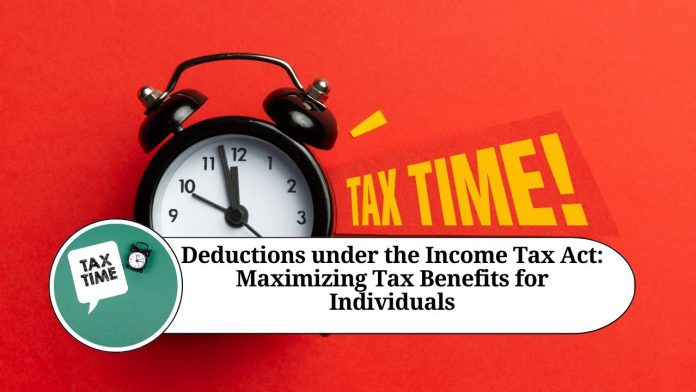Deductions are an important aspect of the Indian Income Tax Act, as they help taxpayers reduce their taxable income, which in turn helps them save on tax payments. Deductions under the Income Tax Act are available for various expenses incurred by taxpayers, such as medical expenses, education expenses, and contributions to charitable organizations. In this blog, we will discuss the different types of deductions available under the Income Tax Act and the eligibility criteria for each.
- Section 80C: This section of the Income Tax Act allows taxpayers to claim deductions for investments made in certain instruments such as Employee Provident Fund (EPF), Public Provident Fund (PPF), National Savings Certificate (NSC), Equity Linked Saving Scheme (ELSS), and Unit Linked Insurance Plan (ULIP), etc. The maximum deduction limit under this section is Rs. 1.5 lakh per financial year.
- Section 80CCC: This section of the Income Tax Act allows taxpayers to claim deductions for contributions made towards pension plans offered by insurance companies. The maximum deduction limit under this section is Rs. 1.5 lakh per financial year.
- Section 80CCD: This section of the Income Tax Act allows taxpayers to claim deductions for contributions made towards the National Pension Scheme (NPS). The maximum deduction limit under this section is Rs. 1.5 lakh per financial year.
- Section 80D: This section of the Income Tax Act allows taxpayers to claim deductions for medical insurance premiums paid for themselves, their spouse, and dependent children. The maximum deduction limit under this section is Rs. 25,000 for individuals and Rs. 50,000 for senior citizens.
- Section 80E: This section of the Income Tax Act allows taxpayers to claim deductions for the interest paid on an education loan taken for the higher education of themselves, their spouse, or children. There is no upper limit to the deduction under this section.
- Section 80G: This section of the Income Tax Act allows taxpayers to claim deductions for donations made to certain charitable organizations. The maximum deduction limit under this section is either 100% or 50% of the amount donated, depending on the type of organization.
- Section 80GG: This section of the Income Tax Act allows taxpayers to claim deductions for rent paid when they do not receive House Rent Allowance (HRA) from their employer. The maximum deduction limit under this section is Rs. 60,000 per financial year.
- Section 80TTA: This section of the Income Tax Act allows taxpayers to claim deductions for the interest earned on savings bank accounts. The maximum deduction limit under this section is Rs. 10,000 per financial year.
- Section 80TTB: This section of the Income Tax Act allows senior citizens to claim deductions for the interest earned on savings accounts, fixed deposits, and recurring deposits. The maximum deduction limit under this section is Rs. 50,000 per financial year.
Conclusion
Deductions under the Income Tax Act are a valuable tool for taxpayers to reduce their tax payments. However, it is essential to carefully review the eligibility criteria for each deduction before claiming it. Taxpayers should seek guidance from tax professionals or refer to the Income Tax Act to ensure they are claiming deductions correctly
Read more useful content:
Here are some FAQs related to deductions under the Income Tax Act:
- What are deductions under the Income Tax Act? Deductions are allowances and exemptions provided by the Indian Income Tax Act to reduce the taxable income of taxpayers, thereby reducing their tax liabilities.
- What is the maximum limit for deductions under Section 80C? The maximum limit for deductions under Section 80C is Rs. 1.5 lakh per financial year.
- Can I claim a deduction for medical insurance premiums paid for my parents? No, you cannot claim a deduction for medical insurance premiums paid for your parents unless they are dependent on you.
- Is there a maximum limit for the deduction under Section 80E? No, there is no upper limit for the deduction under Section 80E for the interest paid on education loans.
- Can I claim a deduction for rent paid if I receive HRA from my employer? No, you cannot claim a deduction for rent paid if you receive HRA from your employer.
- What is the maximum deduction limit under Section 80TTA? The maximum deduction limit under Section 80TTA is Rs. 10,000 per financial year for the interest earned on savings bank accounts.
- Who can claim a deduction under Section 80TTB? Senior citizens above the age of 60 years can claim a deduction under Section 80TTB for the interest earned on savings accounts, fixed deposits, and recurring deposits up to a maximum of Rs. 50,000 per financial year.
- Can I claim a deduction for donations made to any charitable organization under Section 80G? No, you cannot claim a deduction for donations made to any charitable organization under Section 80G. Only donations made to specified charitable organizations are eligible for deductions under this section.
- Can I claim deductions under multiple sections of the Income Tax Act? Yes, you can claim deductions under multiple sections of the Income Tax Act, subject to meeting the eligibility criteria for each deduction.
- Can I claim deductions for previous financial years? No, you cannot claim deductions for previous financial years. Deductions can only be claimed for the current financial year



















